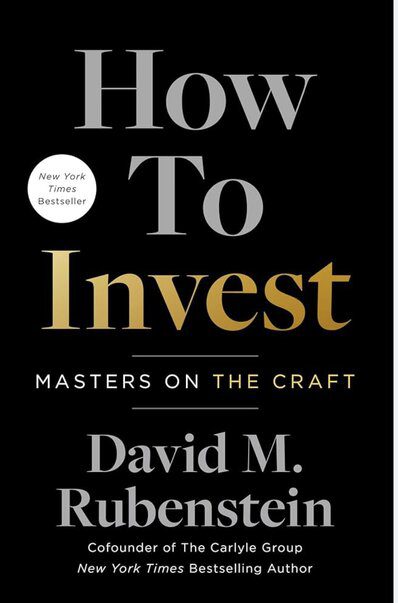In How to Invest: Masters on the Craft, co-founder of The Carlyle Group, David M. Rubenstein interviewed the world’s greatest investors to discover the time-tested principles, hard-earned wisdom, and indispensable tools that guide their practice.
Top Lessons Rubenstein Learned from Interviewing the World’s greatest Investors
Background.
They typically were raised in blue-collar or middle-class backgrounds; rarely are they from fabulously wealthy families, or families where there is a history of investing professionally. Of the investors interviewed in this book, none came from overly wealthy families, though many came from families with professional backgrounds. Early jobs. While some investors created small businesses early, and a few dabbled a bit in investing when young, most came to investing after trying other professional endeavors, not always with the same extraordinary success as they later achieved in investing.
Jim Simons was a world-class mathematician; Marc Andreessen was a noted entrepreneur; Michael Moritz was a highly successful journalist; and Paula Volent was an accomplished art conservator.
Failure.
Many of the great investors had career setbacks or major investment losses along the way. That may well have given them the drive to persist and ultimately to perfect their craft. Intelligence. The great investors have a high degree of intelligence; and they tended to do well academically. While not all investors are math savants like Jim Simons, there is no doubt that an ease with numbers and math is common to the great investors, even if they happened to study social sciences or less math-oriented subjects.
Ultimate responsibility.
It seems clear that the best investors want to own the final decision on investments of any importance. They tend to have self-confidence in their investment acumen and want to make the ultimate judgment on any investment matter of importance, as opposed to delegating the decision to their trusted lieutenants. And they are quite content to take the ultimate responsibility for that final decision. Focus. The ability to focus on the most important factors in an investment decision is one that great investors tend to have in common. They are not as easily distracted by the unimportant factors, and have the ability to concentrate at unusually high levels. The ability to ferret out the key elements of an investment is something the great investors seem to be able to do exceedingly well.
Reading.
Great investors seem to feel there is never too much knowledge one can acquire, and that some of that knowledge can help with perspectives on whatever issue might be raised by an investment. Great investors tend to be relentless readers of books, magazines, newspapers, and curated materials that fit their interests. Some may have had or have dyslexia; but these individuals tend to gather wide amounts of information through other means, often through frequent phone calls or video contacts with industry experts or other investment professionals. Stated another way, great investors have an enormous amount of intellectual curiosity, and want to learn as much as they can about any subject that might remotely relate at some point money, but rather because they view investing as a game of wits.
Great investors tend to be relentless readers of books, magazines, newspapers, and curated materials that fit their interests.
They do not accept Conventional wisdom.
One of the easiest paths in life, and in investing, is to accept and follow the conventional wisdom. Why attract attention by going against the conventional wisdom? Why take a risk of being wrong by rejecting the conventional wisdom? No doubt life can be easier in proceeding along such a path. If you are wrong, you are in the boat with a great many others, and are less likely to attract unfavorable attention or be criticized. But great investors do not accept conventional wisdom; they see what others do not; and they are prepared to take the risk of being proven wrong by going against conventional wisdom. No other characteristic of great investors is as important to their success as their willingness to ignore conventional wisdom, and to try something that others are afraid to try.
Attention to detail.
There are no doubt excellent investors who tend to focus on the big picture—where is the economy going? Are interest rates going to be increased? Is inflation likely to increase? But as a general rule, great investors pay an enormous amount of attention to the actual details of an investment. They want to know of investing. It may be possible to be a great investor working a few hours a day, relying on others to do the hard work needed to understand an investment opportunity. But that is rare. Great investors tend to be workaholics, though they do not regard what they are doing as work.
Philanthropy.
As noted, great investors tend to make considerable amounts of money, and may decide, at earlier ages than was the case decades ago, that they want to impress society not so much with the level of their wealth but with the level—and impact—of their philanthropy.
Investment categories: Mainstream, Alternative, and Cutting Edge.
- Mainstream investors include those individuals who specialize in areas that are relatively traditional.
- Alternative investors include those individuals who pursue investments in areas that were once considered (at least a few decades ago) quite novel or risky, though that is considered to be somewhat less the situation today. These areas, known within the investment world as “alternative,” would include hedge funds, buyouts, venture capital, and distressed debt.
- Cutting-edge investors focus on investments that are considered quite new by even the standards of what was once considered “alternative.” That is to say that these investment areas are ones that may be only a few decades old (or even newer). These would include investments in areas such as cryptocurrencies, SPACs (special purpose acquisition companies), infrastructure, and companies focused on ESG (environmental, social, and governance factors).
All the best in your quest to get better. Don’t Settle: Live with passion.

Comments are closed.